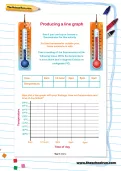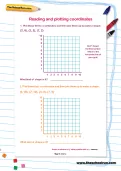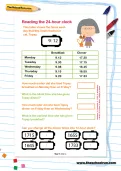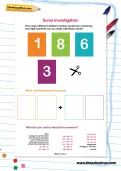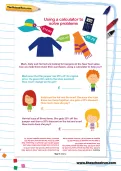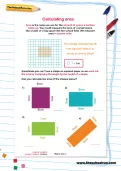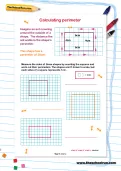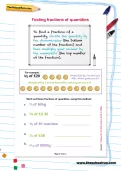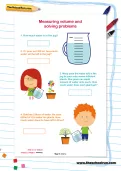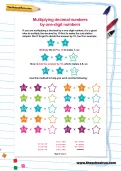Worksheet finder
Search critera
Producing a line graph
See if you can buy or borrow a thermometer for this activity. Put the thermometer outside your home somewhere safe. Take a reading of the thermometer at the following times. Write the temperature in each blank box in degrees Celsius or centigrade. Now plot a line graph with your findings. How are temperature and time of day linked?
Reading and plotting coordinates
Plot these four co-ordinates and then join them up to make a shape. What kind of shape is it?
Reading the 24-hour clock
A KS2 maths worksheet created by an experienced teacher to help your child learn how to tell the time using the 24-hour clock.
Sums investigation
How many different addition number sentences containing two-digit numbers can you make with these cards?
Using a calculator to solve problems
Mark, Katy and Harriet are looking for bargains in the New Year sales. Can you help them make their purchases, using a calculator to help you?
Calculating area
Area is the name we use for the amount of space a surface takes up. You could measure the area of a small space like a table or a big space like the school field. We measure area in square units. Can you calculate the area of these shapes?
Calculating perimeter
Imagine an ant crawling around the outside of a shape. The distance the ant walks is the shape’s perimeter. Can you measure the sides of these shapes by counting the squares and work out their perimeters?
Finding fractions of quantities
To find a fraction of a quantity, divide the quantity by the denominator (the bottom number of the fraction) and then multiply your answer by the numerator (the top number of the fraction). Can you work out these fractions of quantities, using this method?
Multiplying decimal numbers by one-digit numbers
If you are multiplying a decimal by a one-digit number, it is a good idea to multiply the decimal by 10 first to make the calculation simpler. Don’t forget to divide the answer by 10, too! Use this method to help you work out these sums.
